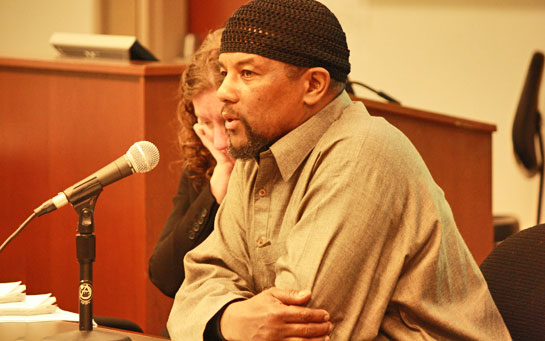
Washington DC Muslim Avon Twitty, also known as Abdul-’Aliyy, speaks to University of MD law students about his time at the CMU and his legal challenge to being designated a “terrorist” with no basis or explanation. Photo by Muslim Link.
While much media attention has been given to the United States’ infamous off-shore prison complex in Guantanamo Bay, Cuba, most Americans have never heard of similar, ultra-restrictive federal prisons located right here in the United States.
On April 10, 2012, the Muslim Legal Society, a student organization at the University of Maryland School of Law in Baltimore, held a discussion entitled “Guantánamo North: Examining Secretive Communication Management Units in the U.S. Prison System”. The discussion, held at 12 noon with free lunch provided, was moderated by Professor Peter G. Danchin, International Law Professor at UMD and featured Alexis Agathocleous, Staff Attorney at the Center for Constitutional Rights, Avon Twitty, a former CMU inmate, and Carrie Johnson, an investigative reporter with NPR. The event was also sponsored by the school’s Journal of Race, Religion, Gender, and Class.
Attorney Agathocleous spoke from New York using Skype, summarizing the major issues related to the secretive Communication Management Unit (CMU) prisons.
“We have a major problem … 2.3 million people are incarcerated in the United States. The US has 4% of the world’s population but 25% of its prisoners. So, its important to understand that the CMU issue is a piece of a [bigger issue],” began Agathocleous, who is on the legal team suing the Federal Bureau of Prisons over issues related to the CMUs.
When a US government planned the new prison system, it was supposed to open up the proposal for public scrutiny and comment, said Agathocleous. However, the government did not do so, nor did they explain the “legal authority” used to create the CMU system. Only after CCR filed a law suit against the Bureau of Prisons in April 2010 – nearly four years after the CMUs were established – did the government allow for public comment.
The CMU prisons impose “drastic and unprecedented restrictions on prisoners’ ability to communicate with the outside world” said Agathocleous. Mail, phone calls, and even conversations within the prison between inmates are monitored and recorded, which Agathocleous says is both a human rights issue as well as a contraction in long standing American penal philosophy given the belief that prisoners reform best through communication with family and friends.
The CMU units hold most Muslim inmates accused of terrorism related crimes; the exact numbers are not available from the government, but CCR believes up to 72% of the inmates are Muslim.
“There is a complete lack of due process” in designating an inmate for the CMU, and there is no meaningful way to challenge a transfer to the CMU, said Agathocleous. This is the basis for the lawsuit filed by CCR and former CMU inmate and Washington DC Muslim Avon Twitty, who spoke at the discussion.
Investigative reporter Carrie Johnson worked on an in-depth piece on the CMUs and described the difficulty in getting information on the prisons.
“Because people inside are not able to speak freely, we leveraged people on the outside like Avon Twitty and also interviewed family members and relatives who know what its like inside,” she said. “Unlike Guantanamo, the people in the CMU do get released and do stay in the United States.”
The Bureau of Prisons was invited to the event but declined to attend.
Twitty, who was incarcerated on a murder charge in the mid-1980s, described how the Bureau of Prisons used a 1970 assault charge when he was 15 years old to designate him an inmate with a “history of assault”, sending him to the CMU as a result. Twitty had numerous memorandums and documents with him, showing the only “disciplinary report” made against him was for failing to stand for the morning count; he was asleep due to medications he had taken.
Speaking to the audience of law students numbering about 30, Twitty described his efforts fighting his designation as an “International Terrorism Associate / Terrorist”, and the deplorable living conditions in CMU units. Flooding, toxic waste and chemicals, and a lack of published rules for the CMU made the prisons unfit for habitation by death row inmates who were transferred out of the decrepit prison, but the CMU inmates continue to be held there.
Today, the 57-year old Twitty continues his legal challenge to his designation as a “terrorist” with CCR and continues speaking out against the existence of the CMUs. The Muslim Link will publish a more detailed article in an upcoming issue, in shaa Allah.